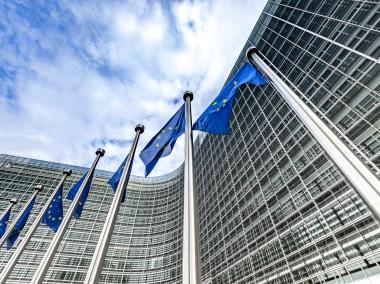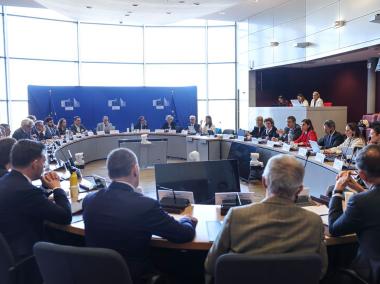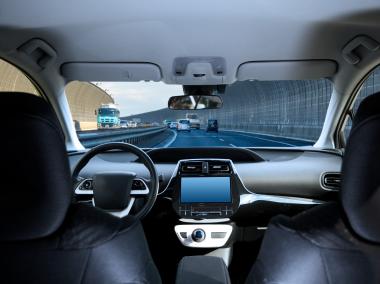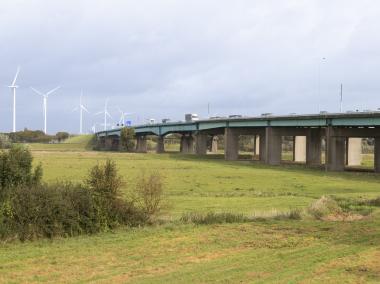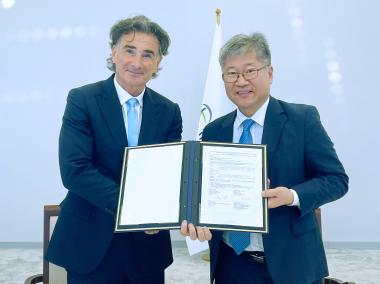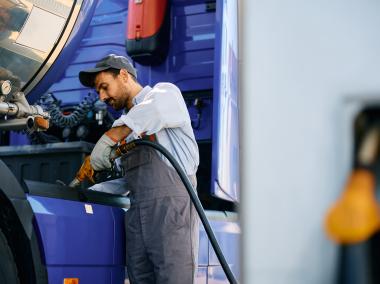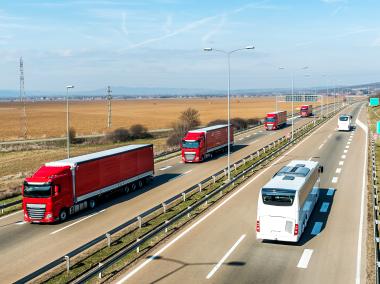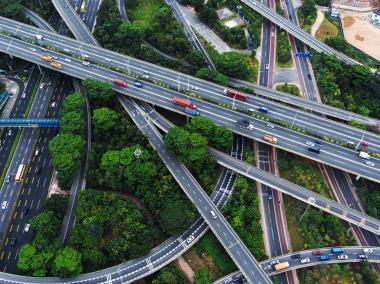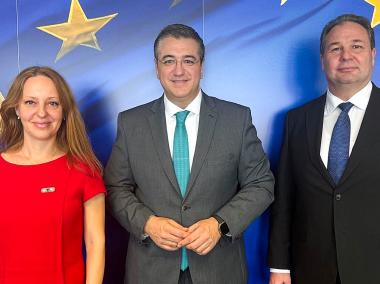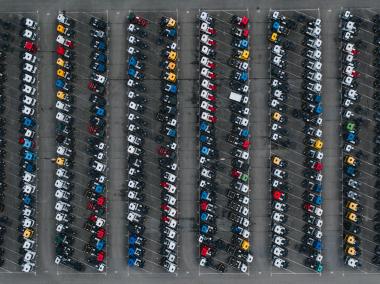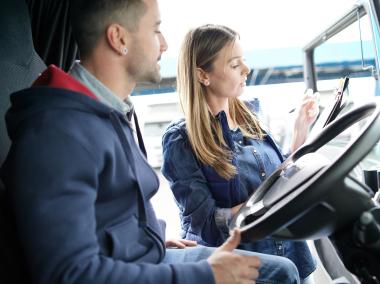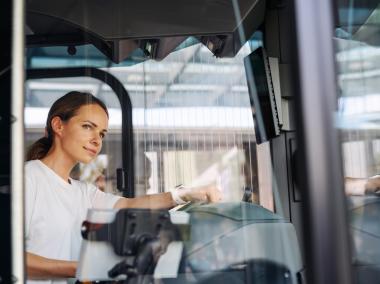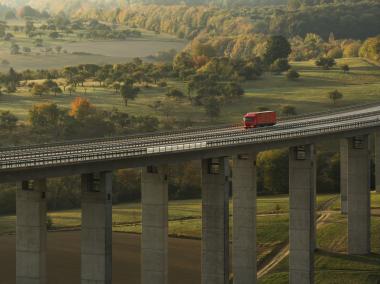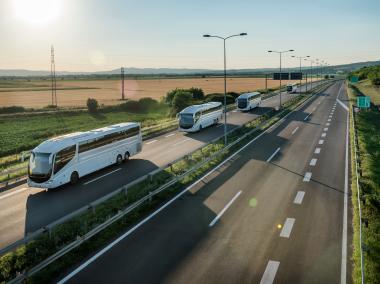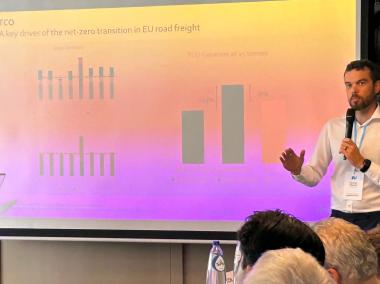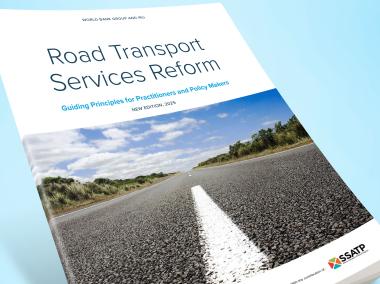
Newsroom
Passenger transport
EU | Brussels
EU industrial accelerator act must reinforce transport backbone
IRU welcomes the European Commission’s proposal for a regulation on the Industrial Decarbonisation Accelerator Act but warns that the transport dimension, the backbone of EU mobility and industrial supply chains, remains underrepresented.
4 Mar 2026 · Environment
EU | Brussels
Coach mobility must be central to EU tourism strategy talks
Coach mobility must be fully integrated into the EU’s future tourism framework if the bloc is to strengthen competitiveness, sustainability and resilience, IRU stressed at high-level discussions in Brussels.
27 Feb 2026 · People
EU | Brussels
European Commission publishes IRU-led study on third-country drivers
The European Commission has published a comprehensive study conducted by IRU on the recruitment and integration of professional bus and truck drivers from third countries into the EU labour market.
18 Feb 2026 · People
Global | Vienna
The future of autonomous taxis in Europe
With robotaxi deployment moving steadily towards commercial reality, bringing the taxi sector into sharp focus across global mobility markets, IRU presented the EU’s automation framework at an international taxi summit in Vienna.
12 Feb 2026 · Innovation
EU | Brussels
EU decarbonisation gets €3 billion, but what’s in it for road transport?
The EUR 3 billion ETS2 Frontloading Facility is a welcome development. However, without explicit prioritisation, commercial road transport risks being left without the predictable support it needs to decarbonise.
6 Feb 2026 · Environment
EU | Brussels
New IRU Intelligence Monitoring: Road transport diesel taxes in Europe
Diesel VAT rates range from 8.1% to 27% in Europe – and 17 European countries apply a CO2-based component to their diesel tax. Our latest Intelligence Monitoring details the various taxes applied to diesel by country.
21 Jan 2026 · Environment
EU | Brussels
EU cannot afford to pause zero-emission heavy-duty charging deployment
IRU, the European Automobile Manufacturers’ Association (ACEA) and T&E urge the European Commission to ensure continuity of EU funding for heavy-duty vehicle charging and hydrogen refuelling infrastructure, warning that a break in support in 2026–2027 would risk slowing the deployment of zero-emission vehicles.
20 Jan 2026 · Environment
EU | Brussels
A year of wins: Key 2025 EU road transport achievements
The EU road transport community made significant gains in 2025. In close cooperation with its members, operators and policymakers, IRU helped drive progress on several major EU files, grounded in on-the-ground realities.
19 Dec 2025 · Environment, People, Prosperity
EU | Strasbourg
Policymakers and industry gather as EU prepares automotive plan reveal
As the European Commission is expected to present its Automotive Package tomorrow, as announced, IRU and its partner associations, the European Association for Forwarding, Transport, Logistics and Customs Services (CLECAT), and the European Shippers’ Council (ESC), will bring together leading Members of the European Parliament and industry stakeholders in Strasbourg tomorrow to discuss solutions, showcase progress, and ensure that fleet decarbonisation ambitions are grounded in operational real
15 Dec 2025 · Environment
Global | New York
Roads eyed for action as UN Decade for Sustainable Transport kicks off
The UNFCCC, COP30 Presidency, and Brazilian Ministry of Transport’s joint statement released yesterday at the launch of the UN Decade for Sustainable Transport puts the pivotal role of road transport in achieving COP30 goals and the Decade’s implementation activities firmly in the spotlight. It calls for the implementation of UN transport conventions, international cooperation, and the deployment of skills development tools to accelerate the transition to sustainable practices and technologies.
11 Dec 2025 · Environment
Spain | Madrid
Europe’s tourism future runs on buses and coaches
From airports to UNESCO sites and cruise terminals to congress halls, buses and coaches are the invisible infrastructure keeping Europe’s tourism moving. Their contribution – millions of passengers carried, billions in economic impact, and essential support to sustainability and cohesion – makes them irreplaceable. As the EU shapes the future of tourism policy, one truth is clear: there is no sustainable tourism without buses and coaches, argues CONFEBUS Director Jaime Rodríguez in this guest ar
11 Dec 2025 · Corporate, People
EU | Brussels
Stronger European grids: a good start, but just that
IRU welcomes the European Commission’s European Grids Package and Energy Highways initiative as an important first step towards modernising the electricity system. But the essential operational enablers for the electrification of commercial road transport are still missing.
11 Dec 2025 · Environment
EU | Brussels
IRU and EU hold constructive exchange on road transport priorities
IRU and EU Transport Commissioner Apostolos Tzitzikostas today discussed how upcoming transport measures align with day-to-day operational realities across the sector.
9 Dec 2025 · Environment, People, Prosperity
EU | Brussels
What coach operators need to know: new EU checks at Dover
The new Entry/Exit System (EES) checks at the port of Dover in south-east England have created a new route, new passenger procedures, and a sealed onward flow. To support operators, IRU’s passenger transport member in the UK, the Confederation of Passenger Transport (CPT), has released a concise video guide.
2 Dec 2025 · People
EU | Brussels
Yes to greening, no to purchasing mandates: Road transport’s voice is clear
IRU has formally conveyed to European Commission President Ursula von der Leyen the united and peaceful protest of 5,302 transport operators and shippers from across the EU. They have signed an online petition opposing the Commission’s intention to introduce mandatory zero-emission vehicle (ZEV) purchasing targets.
27 Nov 2025 · Environment
EU | Brussels
New EU Military Mobility Package: road transport at the core of resilience
IRU welcomes the European Commission and High Representative’s new Military Mobility Package and calls for practical civil and military cooperation to keep the EU’s transport network strong and ready.
20 Nov 2025 · Prosperity
Africa | Nairobi
Driving road safety in Africa: What can governments do?
Road safety is a huge challenge in Sub-Saharan Africa, for private road users and the commercial road transport sector alike. How can government reforms and actions help? We asked an expert from the region.
19 Nov 2025 · People, Prosperity
EU | Brussels
Fit for the future: EU driver training and inspection rules
IRU’s EU goods and passenger transport committees have adopted two new policy positions on driver qualifications and vehicle inspection rules, setting out practical reforms for current and future challenges.
23 Oct 2025 · People
EU | Brussels
New EU driving rules open road to young, safe drivers
IRU welcomes the European Parliament’s final approval of the modernised EU driving licence rules. The reform, agreed between EU institutions earlier this year, strengthens road safety and improves access to the profession, in line with IRU priorities.
22 Oct 2025 · People
Global | Geneva
Efficient decarbonisation needs pragmatic, mode-sensitive reporting tools
IRU, the world road transport organisation, stressed the importance of an operationally grounded template to make decarbonisation reporting more consistent, usable and clear-cut for industry and governments alike at a recent UNECE roundtable.
17 Oct 2025 · Environment
EU | Brussels
The future of passenger transport: Busworld Europe 2025
IRU has wrapped up a successful week at Busworld Europe 2025 in Brussels, driving policy dialogue and industry collaboration on key issues shaping the future of passenger road transport.
14 Oct 2025 · Environment, People, Prosperity
EU | Brussels
IRU leads policy discourse at Busworld 2025
The world’s biggest business-to-business exhibition dedicated exclusively to bus and coach returns to Brussels and IRU is at the heart of it. As a partner of the Busworld Europe Congress 2025, IRU will lead key panel discussions.
3 Oct 2025 · Environment, People
EU | Brussels
IRU calls for fair energy taxation across all EU road passenger services
As the Danish Presidency of the Council of the European Union seeks to close negotiations on the long-stalled Energy Taxation Directive, IRU is urging Member States to ensure that all road passenger transport services are treated fairly.
1 Oct 2025 · People
Global | Brussels
IRU Green Compact Roundtable at ACEA tackles alternative fuels and vehicles
How can commercial road transport transition to zero-emission vehicles while keeping costs under control? This was the question at the heart of the latest Green Compact Roundtable, hosted by the European Automobile Manufacturers' Association (ACEA).
29 Sep 2025 · Environment
EU | Brussels
Driving profitability: Fuel, tolling and cost trends in the EU
Discover how fuel and tolling costs are evolving across the EU. Backed by the latest data and regulatory insights, this concise 2025 Intelligence Briefing analysis reveals key trends impacting road transport operators’ bottom line. In today’s economic climate, understanding these cost drivers is essential for planning and sustainability.
29 Sep 2025 · Intelligence
Global | Geneva
World Bank and IRU launch new road transport sector reform guide
Improving laws, governance, compliance, skills certification and operating conditions to drive safer, cleaner and more efficient commercial road transport is the aim of a new sector reform guide from the World Bank and IRU.
